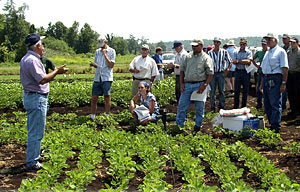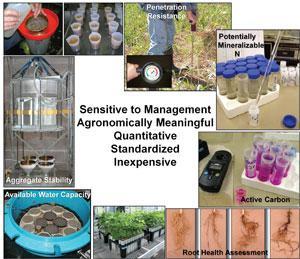Report
International Cooperation in an Environmental Sector by NGO
Omari Richard Ansong ![]()
Department of International Environmental and Agricultural Science (IEAS)
Graduate School of Agriculture
Host Organization: Cornell Soil Health Center-Cornell University.
Location: New York
Duration: 2013.8.31~2013.11.1
Key words: Soil, Soil health, Soil management, Soil testing parameters, Sustainability
1. Description of the host institution
Cornell Soil health center is an appendage of the Department of Soil and Crop Sciences of the Cornell University. The center is primarily made up of academic staff, researchers, extension educators, laboratory technicians as well as administrative staffs of the department. The center is headed by a senior lecturer of the Soil science department. The extension educators serve as the main channel whereby scientific information is delivered to the various stakeholders who are usually commercial farmers. The following organizations; New York Farm Viability Institute, New York State IPM Program, Northeastern Sustainable Agriculture Research and Education and the Northern New York Agriculture Development Program currently support the center.
The main goals of the center include identifying and developing solutions to the critical soil quality problems currently reducing farm sustainability and profitability for growers in New York State and the Northeast region. The center is also committed in working with growers to incorporate new practices for the benefit of their soils and to ultimately improve farm and environmental sustainability. Again, some of their activities are aimed at developing the tools and infrastructure to provide meaningful soil quality assessment and management suggestions to complement existing soil testing services in a cost-effective manner. Finally they aim at increasing soil health literacy among growers and agricultural support professionals.
 |
Fig1. Extension and outreach program by Cornell soil health researchers with farmers. |
The center is currently involved in the following activities; diagnosing the health status of soils from various farms and different locations using a set of established protocols at a fee-for-service basis since 2007, organizing seminars, workshops, field days on critical Soil health issues for farmers, training various stakeholders affiliated to Soils from various parts of the world, conducting research on sensitive and critical issues on agricultural sustainability.
2. My activity during the internship
The center has a number of assessment protocols that are usually used as an indicator in determining the health status of agricultural and cultivated soils. They are field sensitive management, agronomically meaningful, quantitative, inexpensive and standardized tests which are exclusive to the center. The methods have been proven to be very effective in reaching the local audiences of each state as well as facilitating networking between university, cooperative extension, and other agricultural service providers within the Northeastern part of New York state.
During my 8-week stay with the Cornell soil health center, I spent some of my time undergoing training on the established assessment protocols of the center. These protocols were necessary as far as my quest of enhancing my knowledge on Soil management approaches were concerned. Also I factored the possibility of incorporating the skills and strategies to be learnt into my future studies as well as in my future career.
 |
Fig.2 Some Laboratory testing procedures used at the Cornell soil health laboratory. |
I also participated actively in field experiments being undertaken by the center. The center was conducting a number of field experiments such as nitrogen use efficiency in corn production, effects of intensive plowing regimes on the biological, physical and chemical properties of soils. I had the opportunity acquaint myself with some skills required in carrying out such kind of field experiments.
The center also organized weekly seminars fully participated by its members. Some members gave presentations on their study areas or a related soil health management issue. It was an interactive and productive learning activity for me since I learned a lot especially on issues about soil management.
3. Background of the targeted environmental issue
My targeted environmental issue with regards to the internship was sound management of soils for human sustenance. With the ever increasing world human population raising the need to boost agricultural production, intensification of agriculture seems to be the closest call for mankind. Intensive crop production has often resulted in soil degradation contributing to reduced crop yield, increased production inputs and lower farm profitability.
Soil is at the center of human existence and key in supporting almost all the activities of man. For this reason, it requires much more attention and care than being given now since the more we know our soils, the better we can care for it. Farming activity for instance is not a natural process (Bowman 1994), since it disrupts the soil in many ways. For example, mono cropping and continuous tillage decrease diversity of life forms, destroys soil structure, promotes loss of organic matter and finally disrupts nutrient cycling. These practices in addition to other factors cripple the soil's ability to respond to stress and leave it unable to function the way it should.
Generally in terms of agricultural production, people`s opinions and understanding on soil management with the aim of sustaining it is usually narrow. This is exhibited usually in the type of soil management regimes adopted in their farms. As a result, agricultural lands have been often abused through intensive cultivation in the form of heavy plowing, indiscriminate burning, poor fertilization, etc. These negative practices have resulted in problems such as soil erosion, soil compaction, leaching, poor drainage, low organic matter levels, reduced fertility of soils, reduced biological activity etc. With these problems on the rise, human sustenance is not assured. It is however not surprising that some locations on the globe notably the Sub Saharan Africa are already experiencing massive civil strife and food insecurity challenges.
Adopting healthy soil management techniques have long been suggested by the academia, experts and researchers as one of the strategies to curb the above threats to the soil. They range from use of organic plant and substrates or residues, minimizing plowing regimes, cover cropping, manuring, crop rotations etc. while ensuring a steady growth in agricultural productivity. As seen above, some of the approaches suggested are less expensive, practical and known to ensure a long lasting sustainability of the soil once implemented.
However, there seems to be a massive ignorance and resistance to change attitude on the part of farmers and other stakeholders due to their limited understanding on soils suggesting the need to re-strengthen the education on such targeted people through various means such as seminars, workshops, field demonstration, field days, mass media education etc.
4.My thoughts about environmental leaderships and future vision
Strengthening the younger generations on leadership roles with regards to issues about the environment is indispensable. Such a move and awareness creation is useful as far as the future of posterity is concerned. My thoughts about environmental sustenance and leadership are grouped into short and long terms. In the short term, I still see myself in the learning process about the critical issues of the globe and while in the long term, I will have to play a role in protecting the globe through research, extension and educational activities especially in my region. Referring to the massive improvement in my view of soil health management approaches now, I hope to sell to my colleagues the idea of setting a similar organization in Ghana by enhancing soil literacy and awareness creation among farmers in my region similar in perspective to that of Cornell Soil health. With that in mind, farmers and other stakeholders with limited knowledge about soil management issues can benefit tremendously while aiding to protect our resources. Again, I am planning to undertake a research work hopefully in Ghana by adopting into my study some of the Soil health assessment protocols learned during my internship experience.